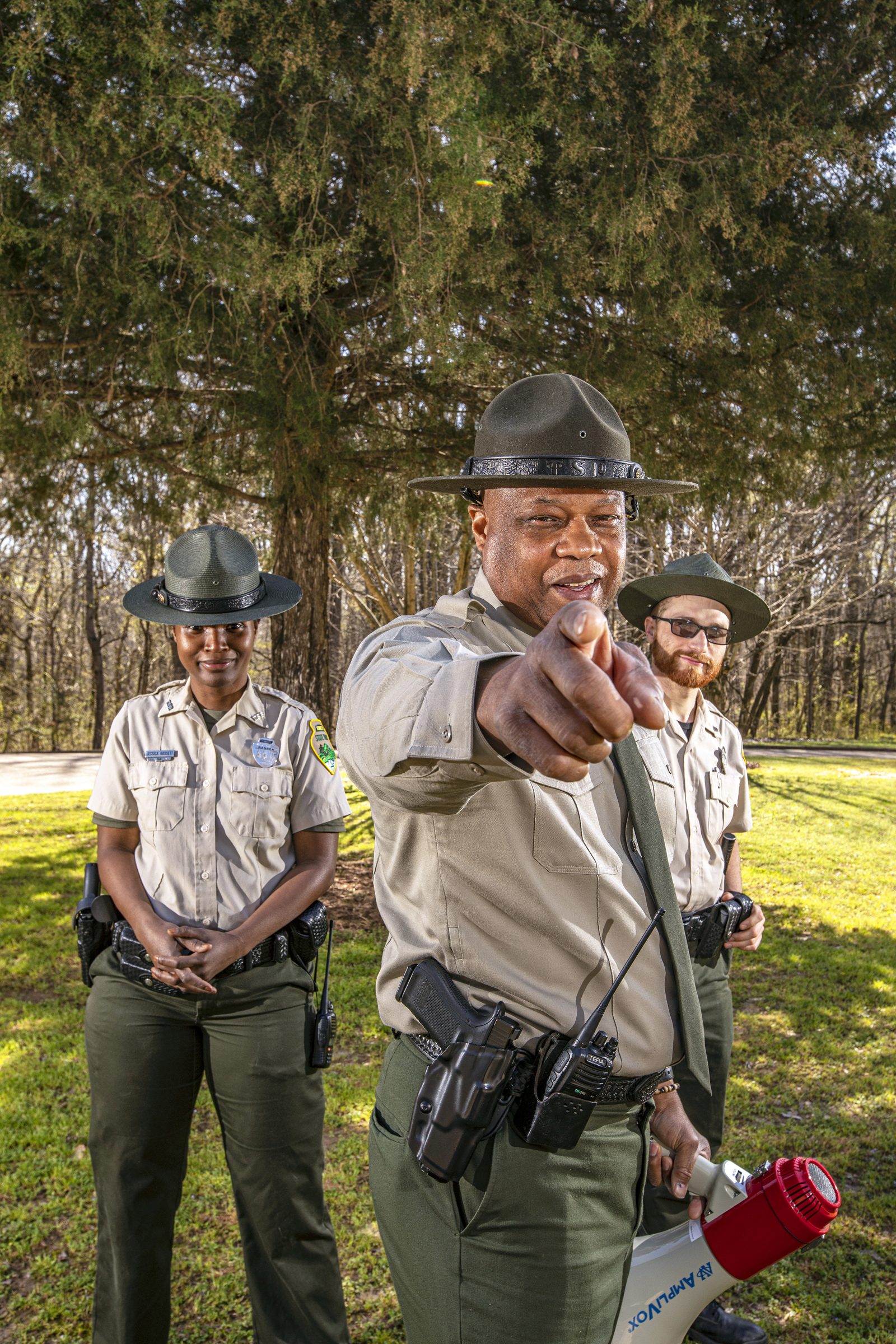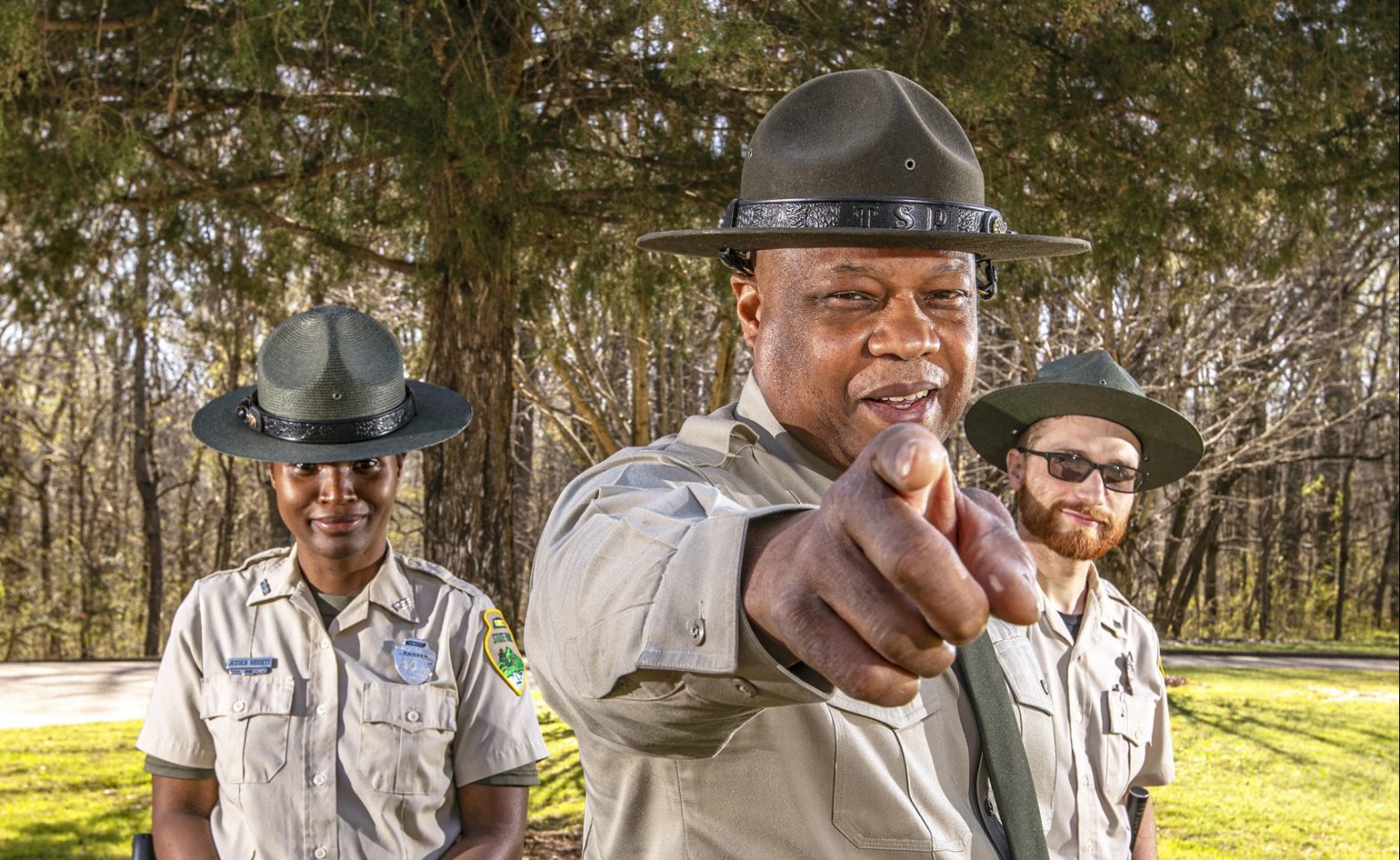“Who cooks for you?” might be the number one question asked at T.O. Fuller state park in South Memphis. It won’t be asked by visitors. It will be asked of visitors — from a resident barred owl, aptly named Hero.
Barred owls are indigenous to this area and have a distinctive call that sounds like a question to many, specifically the question, “Who cooks for you?” This inquisitive bird found a place at the park’s interpretive center, formerly the golf clubhouse for the old course that closed in 2012. Four years later, this state-of-the-art nature center opened, where injured animals are nursed back to health and released back to the wild.

(Photo: Justin Fox Burks)
Hero sustained injuries that would not allow him to be released. He shares the center as his home with a screech owl, a turtle, and a corn snake with similar stories. To earn their keep at the center, the resident animals are employed by park rangers for teaching opportunities on and off the park grounds.
Also earning his keep is the fourth park manager in the history of T.O. Fuller State Park, Jimmy Warren, who took the reins from Ranger Calvin Robinson in March 2017. Nearing his four-year anniversary as park manager, Warren, a retired Memphis police officer, talks about park features, activities, and possibilities. He has a personal vested interest in the park, as the first park manager with roots in the area.

(Photo: Justin Fox Burks)
“This state park was built in 1938 by the Civilian Conservation Corps, and was the first state park opened for African Americans east of the Mississippi. It was named after Dr. Thomas O. Fuller in tribute to the man who was an African-American educator, leader, and pastor for our community,” Warren says.
“After 30 years as a community officer, I wanted to come back to my neighborhood and do what I could for my park, my neighborhood, and my community,” Warren continues.
Warren grew up one block from T.O. Fuller Park and attended nearby Mitchell High School. The park was his backyard, the place where he and his family enjoyed all the amenities it had to offer.
His memories include a classmate who lived in the area where the C.H. Nash Museum at Chucalissa stands now. The area was called Chucalissa Village in recent history while Native Americans still lived on the property. The Choctaw Nation tribe, led by Chief Grady Jones, made their own clothes and jewelry, among other things. Warren remembers the daughter of Chief Grady, Mitchell High School classmate Sandra Jones. Her family gifted Warren some bowls made by their tribe. He laments that after seeing an Antiques Roadshow episode where similar bowls were appraised at a high value, his gifts were long gone.
After four years under his leadership, what has Warren done with the park? And what does he have planned? Increasing foot traffic was a goal at the top of Warren’s list.
At the interpretive center, a program has been implemented called Conservation Consequences. It serves the students in local public schools — specifically those in the 38109 ZIP code and Whitehaven. Topics are focused on preservation (including the resident critters) and life skills. Rangers talk about conservation and preservation, while community leaders engage students in conflict resolution skills — and the consequences of not using those skills.
A Tires to Trails grant was recently awarded to the park. It combines efforts to clean up the area with creating ADA-compliant usable trails by recycling old tires that were gathered during a recent MLK Day of Service. A company in Bristol, Tennessee, grinds them to concrete consistency for usable trail-building material.
Current park amenities include a baseball and soccer field, basketball courts, a swimming pool, and tennis courts. Where the golf course used to be is now open grassy and hilly land, an area perfect for watching wildlife.


(Photos: Justin Fox Burks)
Warren says that when he was a kid, he used to watch Eddie Payton — the brother of the former Chicago Bears great, Walter Payton — play golf where the grassy area is now. He vividly remembers Eddie running around the golf course to intimidate his opponents. The intimidation tactic, Warren says, was due to the fact that Payton liked to bet on his golf game but was really bad at golf.
“He [Payton] had these huge legs like tree trunks and wore shorts, so he could run around the course and try and scare his opponents,” reminisces Warren, with a chuckle. “The end result is that I witnessed him lose money, a watch, and various other personal items. He was just bad at golf.”
Warren is happy that the public can now enjoy watching eagles, deer, ducks, and numerous other wildlife species where Eddie used to run.
Many of the plans to increase park traffic have been put on hold or have been transformed to fit current health mandates. Ranger Jessica Gossett is tasked with maintaining and implementing evolving programs as the pandemic rules and regulations wax and wane.

(Photo: Justin Fox Burks)
Leaning on her educational background through AmeriCorps and substitute teaching, Gossett says, “Through play, children learn about the environment. Play is learning. Programs focus on hands-on and recreational play. Sometimes that means I just go out there and play games, have fun, and run around with young park visitors.”
Some programs Gossett has in the works, awaiting relaxed health mandates, are a program teaching about light pollution, a weather teaching program (developed by a University of Memphis intern), and a geology teaching program. Future activities she hopes to initiate as more people get vaccinated, include LARPing, yoga, and fieldwork.
Look for tree-planting opportunities in April and a program in development called Backyard Greens that showcases plants at the park — and in your backyard — that were brought by settlers to our area. These include purple deadnettle and henbit, two very similar plants in the mint family. One is invasive. Both are edible. Participants will learn to identify and use these plants, as well as other common weeds, in salads and for medicinal purposes.
For now, most programs are still virtual or on-demand. Gossett recently initiated some virtual programs on T.O. Fuller Park’s Facebook page, which include a Black History series, a Living History series about enslaved and free women, and a Black Women’s Suffrage in Tennessee presentation, in honor of the centennial of the 19th amendment.
Gossett says he has noticed a drop in park visitors who may not know that the day-use area is open. “The day-use area is great to view wildlife. If you are still and quiet, you’ll meet great blue and little blue herons, as well as the occasional beaver.”
Catching a beaver at play one day in the day area, Gossett videoed the semiaquatic rodent and posted its activities on the park’s Facebook page. She’s also come face-to-face with a beaver during a survey of the wetlands.
“Beavers are territorial. While surveying the wetlands for an upcoming wetland hike that is in the works, I was stopped by beavers. By ‘stopped,’ I mean they rammed my kayak. Earlier that same day, I accidentally scooped up a diamondback water snake in shallow waters with my paddle.”

(Photo: Justin Fox Burks)
In case you are wondering, Gosset said that the beaver was more concerning. Diamondback water snakes are non-venomous.
Ranger Decoda Muller works in tandem with Gossett but uses a different skill set. Muller, who has a carpentry background, has designed bat boxes with donated supplies. While there are many bats who call the park home, Gossett says she wants more, because she was bitten by a mosquito recently. She hopes to find students or scouts who want to put together, paint, and install more bat boxes throughout the park under Muller’s direction.
Muller is currently presenting the birds of prey and reptile programs on demand. Weed wrangles, traditional hikes, kayaking, plant programs, tree-planting, and birding programs will be scheduled in the near future.
As of now, the pool and basketball courts will be closed this year. Other areas that host low-contact sports are open, including soccer fields, baseball fields, and tennis courts. Reading programs that can be accessed virtually and that feature park storyteller Mother Wit (Joy Scott) and the rangers will be added, as well as prerecorded Native American history presentations.
The 1,138 acres of parkland have lots of self-guided activities, Gossett says, especially after a rain, when the ephemeral creeks (temporary creeks) are flowing.
“Along the Discovery trail near the visitor center, these creeks pop up after a rain. At this time, visitors can find crawdads in the muddy silt and see raccoons who come out to feast on them. Native American homestead features like brick and ceramic remnants can be found while the creeks are running,” Gossett says.
T.O. Fuller is the only state park within the Memphis city limits. The park protects and showcases a unique natural habitat while offering a wide range of outdoor recreational assets. Rangers Warren, Gossett, and Muller invite you and your group to come out and experience the magic.
